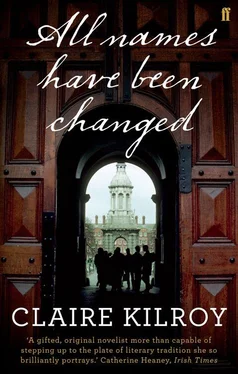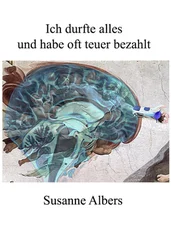Claire Kilroy - All Names Have Been Changed
Здесь есть возможность читать онлайн «Claire Kilroy - All Names Have Been Changed» весь текст электронной книги совершенно бесплатно (целиком полную версию без сокращений). В некоторых случаях можно слушать аудио, скачать через торрент в формате fb2 и присутствует краткое содержание. Год выпуска: 2010, Издательство: Faber & Faber, Жанр: Современная проза, на английском языке. Описание произведения, (предисловие) а так же отзывы посетителей доступны на портале библиотеки ЛибКат.
- Название:All Names Have Been Changed
- Автор:
- Издательство:Faber & Faber
- Жанр:
- Год:2010
- ISBN:нет данных
- Рейтинг книги:5 / 5. Голосов: 1
-
Избранное:Добавить в избранное
- Отзывы:
-
Ваша оценка:
- 100
- 1
- 2
- 3
- 4
- 5
All Names Have Been Changed: краткое содержание, описание и аннотация
Предлагаем к чтению аннотацию, описание, краткое содержание или предисловие (зависит от того, что написал сам автор книги «All Names Have Been Changed»). Если вы не нашли необходимую информацию о книге — напишите в комментариях, мы постараемся отыскать её.
All Names Have Been Changed — читать онлайн бесплатно полную книгу (весь текст) целиком
Ниже представлен текст книги, разбитый по страницам. Система сохранения места последней прочитанной страницы, позволяет с удобством читать онлайн бесплатно книгу «All Names Have Been Changed», без необходимости каждый раз заново искать на чём Вы остановились. Поставьте закладку, и сможете в любой момент перейти на страницу, на которой закончили чтение.
Интервал:
Закладка:
Who could have divined that that fine room was there all along, concealed behind a grey Dawson Street façade like a clandestine church, a priest hole? How many times had I walked past without noticing? I possessed little knowledge of civic Dublin, of the institutional fabric of the city, despite having lived there for four years by then. That feeling of strangeness, of unfamiliarity, of having inadvertently stumbled upon a hidden world, detonated a headiness in me, in us.
Certain minor details from the evening stood out in our minds all those years later. We each recollected with undiminished agitation the faulty microphone, for instance. Glynn stepped up to the lectern to applause, nodded his thanks, opened Hibernia to the appointed page, but his voice, when he spoke, did not receive the expected amplification, and thus audience members at the back (Faye, Aisling) failed to hear a thing. Antonia and I, sitting at the top, picked up what the others missed. (‘Good eve— Jesus ’ is what he said.)
Not being in the least bit technically minded, and certainly not prepared to give it a bash in front of all those people, Glynn simply removed his book and took a step back. A man appeared and tinkered behind the podium until he found the switch that turned the shagging thing on; the microphone which, when it did eventually decide to work, converted all of Glynn’s p ’s into minor explosions, so that every time he pronounced a word beginning with that letter (‘profundity’ he used at least twice), the backfire caused him to recoil from the grey foam turtle head as if it had electrically shocked him. All five of us, a full four years after the fact, still harboured resentment towards this unsatisfactory piece of equipment and thought — individually, unbeknownst to each other, scattered throughout the soggy audience of approximately two hundred — Could we not, as a nation, have done better for the man? Wasn’t this precisely the class of shabby disregard that drove Joyce and Beckett away in the first place?
And the coughers. Why were they there? And in such numbers. Those dirty sickly people teeming with greasy germs — why had they come out that evening if they were so very unwell? Glynn had to raise his voice to be heard, and repeat sentences, or halt them halfway through until a bronchitic fit subsided. ‘ Stop it! ’ Antonia had hissed at the old man beside her, as if the event were a recital. He did stop, confirming her suspicion that much of this coughing was recreational, stemming from habit as opposed to need. Perhaps it was the same crowd shooed like chickens out of St Anne’s Church at closing time, there simply to spend a few more hours in a heated building, hunched up in overcoats like perverts. There was so much coughing, and in such rhythmic patterns, that we discussed the possibility that it was an act of sabotage. Glynn had enemies, jealous rivals. I concentrated on his voice, my hands clenched into fists. The Meeting Room was beginning to smell of wet dog.
The man who always showed up to readings was first to pose a question, that vain white-haired man who was more interested in listening to the sound of his own voice than in hearing Glynn’s response. That man, who didn’t know the difference between a query and a speech — all of us remembered him distinctly. A question mark, we observed, could not with any degree of conviction be placed at the end of his concluding sentence. It was merely a verbose statement of opinion. Glynn, we concurred, delivered the most felicitous response. ‘Good for you, sir,’ he replied cheerfully, and then, swiftly pointing at another raised hand, ‘Next.’
In his answers, Glynn demonstrated no desire to entertain or amuse, no tendency towards flippancy, instead speaking about the act of writing with generosity and lucidity. ‘The writer’s role,’ I recall him saying, ‘is to snow on things, that is, to pick out the surfaces which go unnoticed when it does not snow, to illustrate the world as it really is: a chaos of peaks and troughs.’ Yes, I found myself nodding; yes, that’s it exactly! This was what I had come to hear. ‘Pliancy—’ Glynn continued, but the explosion on the p put him off his stride, and we lost whatever he was about to tell us.
At the book signing which followed the reading (badly organised, queue as bloated and malformed as a tumour), the pushiest denizens of Dublin were, as ever, attended to first. Antonia would have been up amongst them but for her delicate state of mind. She feigned rapt fascination with the cover of Hibernia to avoid meeting the eye of past acquaintances, though this measure was unnecessary and well she knew it. Her old friends no longer acknowledged her. There’d been much unpleasant talk surrounding her separation, she told us. ‘Dublin,’ she noted, ‘is excruciatingly small.’
The Meeting Room fell suddenly quiet when the rabble of boors left, clattering the double doors carelessly in their wake. The rest of us drifted in single file along the aisle, waiting for a brief audience with the man at the top. At a table, with a publicist standing in attendance to his right — a whole publicist, God forgive us our sins — sat Glynn, listening, nodding, inscribing. He was for the most part obscured from view by those ahead in the queue. We caught a glimpse of elbow here, a silvery flash of curl there. The smell of antiquarian books lining the walls was as musky as incense, the gold titles embossed on their spines arcane as alchemy. The brass fittings of the overhead lamps glinted down on us like thuribles. There was an atmosphere of the midnight mass, though it wasn’t past nine.
All manner of thoughts flowed through my mind as I progressed, head bowed, toward Glynn; Russia at the turn of the last century, extreme unction, a handful of uncut emeralds. These images fell beyond the pale of my habitual sphere of reference, and I was happy to break loose for once in my life from the usual banal restrictions that held my imagination in check. My mind glided freely as if it had been released into the locked wing of an old castle in the great forest of a country since dissolved, some long-gone kingdom that exists only in the annals of history and the realm of folk memory and is thus more alluring, more compelling, than the modern-day place could hope to be. Bohemia, say, or Dalmatia; Hibernia itself.
Nothing that transpired that evening quite took place in the present tense, nor did it feel as if it were unfolding in the city I knew so well but, rather, in some chamber out of time. More than anything, it seemed that I was reading it, in the purest, most liberating sense of the word reading, that state in which the mind is lifted out of its confines and cut free to roam at will behind the veil of a book. My imagination felt airborne, as if it had set down a great weight it had been carrying for miles, for years, until it had all but merged with it.
I — we — still heard the occasional blast of traffic on Dawson Street, but it sounded improbable, artificial, noises off on a stage set. That I hadn’t previously been aware of that building’s existence compounded the impression that the real world had been temporarily suspended. It was extraordinarily peaceful. I don’t recall ever having felt so calm. Things made sense. Faith systems, religious rituals, liturgy, made sense that night as we closed in on Glynn — not as they pertained to the divine, but in the true value of ceremony, the recalibration it induced.
We each of us in our own way attempted to explain to Glynn as best we were able how much his work meant to us. We stuttered and blurted before him, blushed and shifted our weight. Antonia was too curt and said it came out patronisingly, as if she were addressing the hired help. ‘Wonderful work,’ she informed him, followed by a hearty, ‘Well done,’ hearing in her voice an echo of the belligerent insincerity of Glynn’s earlier ‘Good for you!’ Antonia was cursed with an unfortunate manner, but couldn’t seem to help herself. Aisling was too vague: (‘I get it. No, really: I get it.’) Guinevere, by the time she reached the top of the queue, was trembling from head to toe. She didn’t utter a syllable, could barely manage eye contact, and instead spilled warm smiles all over the great writer’s hands. Faye said she just closed her eyes.
Читать дальшеИнтервал:
Закладка:
Похожие книги на «All Names Have Been Changed»
Представляем Вашему вниманию похожие книги на «All Names Have Been Changed» списком для выбора. Мы отобрали схожую по названию и смыслу литературу в надежде предоставить читателям больше вариантов отыскать новые, интересные, ещё непрочитанные произведения.
Обсуждение, отзывы о книге «All Names Have Been Changed» и просто собственные мнения читателей. Оставьте ваши комментарии, напишите, что Вы думаете о произведении, его смысле или главных героях. Укажите что конкретно понравилось, а что нет, и почему Вы так считаете.












